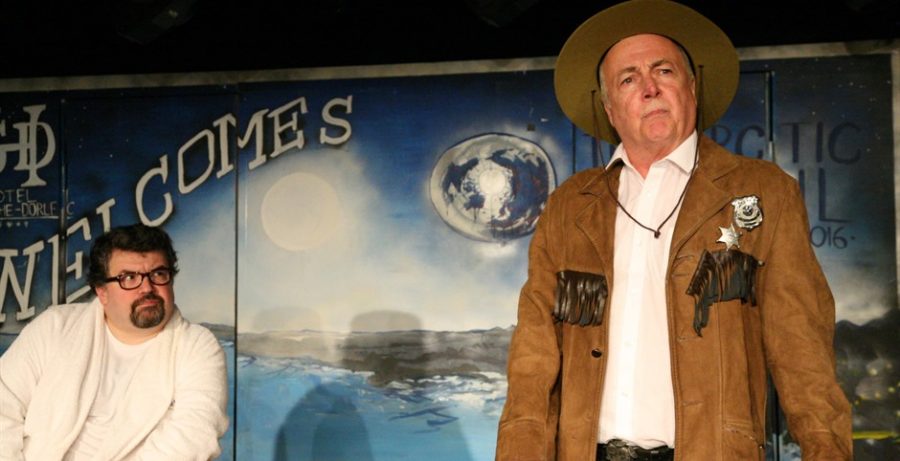The Traverse Theatre is celebrating playwright and activist Dario Fo and his late wife Franca Rame’s work in a series of political plays, titled Dancing With Colours, Whipping With Words. First up is Breaking the Ice, written by Kieran Lynn and directed by Tony Cownie, a farcical satire about the battle to exploit the Arctic’s resources. Whilst the play covers a wide range of political points, its main strength is in its subtle mockery of bureaucracy on the world stage.
Newly appointed government advisor Frank Montgomery is attending a conference in Alaska to advise the world powers on whether they should bring their industries into the Arctic. The only problem is that he has left his speech on the plane, and has also managed to spill yoghurt all over his suit. As he tries to prepare for his big debut into the world of diplomats, Frank is waylaid by a variety of colourful characters who all have something to say about the implications of his advice.
The talent of Jimmy Chisholm and Nicola Roy is obvious in the dizzying array of accents and characters that they inhabit, from the noble Sami policeman to the overzealous American soldier guarding the conference. Their performances are almost larger than life compared to Steve McNicoll, but this contrast gets across well the way these personas run circles around the bumbling but ultimately good-natured Frank. The play’s farcical elements could perhaps have been more heightened towards the end of the play. The tension about Frank’s impending lateness to his first conference did not really increase, and might have added even more comic value.
A lot of the play’s absurdity and humour comes not from the bigger points that it is trying to make but more from the smaller details. Scenes depicting the hapless intern who has exaggerated their work experience in abduction, being trapped in an endless loop of phone transfers when trying to escape a kidnapper, and the differences between American and British definitions of tea all give rise to a wry chuckle. The play endears itself to the audience by finding comedy in familiar moments that happen as much at the top amidst the world’s decision makers as amongst us ordinary folk.
With so many opinions given about the future of the Arctic, the play comes worryingly close to moralising about humanity’s relationship with the environment – something not quite in sync with the rest of the play’s light humour. Luckily the conference breaks for lunch, so Frank’s defining political moment is interrupted by another bureaucratic timetable. The significance given to a cup of tea, a lunch buffet, or an unfortunate bathrobe almost feels like a comment on our world leaders’ priorities. Nothing will ever get fixed whilst everyone remains fixated on their own home comforts.
